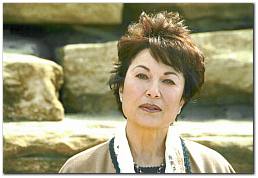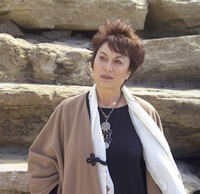
by Pearl Sheffy Gefen – Toronto Star
 Malka Marom wrote her novel Sulha for “readers who don’t know about the Middle East and couldn’t care less. My nephew is married to a Japanese woman, and she told me that her mother had known nothing about Israel. Her mother was a source of inspiration; she and a fisherman in the most remote part of Japan who never heard of the Middle East.”
Malka Marom wrote her novel Sulha for “readers who don’t know about the Middle East and couldn’t care less. My nephew is married to a Japanese woman, and she told me that her mother had known nothing about Israel. Her mother was a source of inspiration; she and a fisherman in the most remote part of Japan who never heard of the Middle East.”
Sulha is passionate, poetic and never preachy, exotic and contemporary, ancient and today’s news. Rare in the avalanche of books on the Arab-Israeli conflict, most of which take a stand, Marom’s Sulha gives every side its say in the infinitely complex situation. “I refused to make it simple. Life is not simple, love is not simple, nor is forgiveness, reconciliation and peace, especially in the Middle East. To just present one aspect is irresponsible.”
Marom left her comfortable Toronto home to live for months with nomads in the Sinai desert, sleeping in squalid, lice-infested tents, defecating in ditches, and losing 40 lbs in the process.
The former international folk-singer and award winning documentary maker, still doesn’t know quiet what had compelled her to write Sulha. “Maybe it’s the longing for roots. The Beduin live like my Israelite ancestors did when they fled Egypt and spent 40 years in the desert. Or so I believe. ”
The book has received good reviews, and has been selling well. One reviewer called the 560 page novel the “surprise hit of the literary season.”
“The Beduin accepted me as a ‘stranger-no-stranger’ with great respect and affection,” Marom says. “They called me Malika, which means queen. They believe they’re of noble blood and lineage, so the Beduin man has self-esteem, he’s raised to be the protector, the voice and face of his people. The women are veiled, and can be divorced by their husbands merely repeating ‘I divorce you’ three times (and he gets to keep the kids).Yet they also believe they are of the nobility, therefore they give birth to noble men and women.”
Marom is chatting beside the fireplace in the Toronto home where she brewed tea the Beduin way while she wrote her first pages (which won her an Ontario Arts Council award for the most promising work of fiction in progress), surrounded by an eclectic mix of art works from east and west: Iroquois masks, Beduin sculptures, Eskimo and Egyptian carvings, Canadian, Israeli, French and Spanish paintings. And a piano.
She’s wearing a handsome Beduin gown, embroidered on hand-woven cloth. “When I’m with the Beduin, I wear jeans, in Toronto I wear Bedouin dress,” she shrugs. “I’m always the outsider everywhere. Only in Israel do I wear normal clothes.” She laughs, a deep, rich laugh.
Sulha is passionate, poetic and never preachy, exotic and contemporary, ancient and today’s news. It tells of Leora, an Israeli war widow living in Canada, whose husband was killed in the 1956 Sinai war. Most of the novel is set in the Sinai when Israel is about to return it to Egypt, as Leora seeks the spot where her husband’s plane was shot down.
 Rare in the avalanche of books on the Arab-Israeli conflict, most of which take a stand, Sulha gives every side its say in the infinitely complex situation. “I refused to make it simple. Life is not simple, love is not simple, nor is forgiveness, reconciliation and peace, especially in the Middle East. To just present one aspect is irresponsible.” Israelis debate hotly, the Sinai Beduin weigh the merits and demerits of Israeli and Egyptian rule, the Israeli Bedouin argue about Israel’s attempt to urbanize them, to stop their goats from gobbling up the crops planted with much sweat and little water in the Negev desert – and to provide space in tiny Israel for army training after they leave the Sinai.
Rare in the avalanche of books on the Arab-Israeli conflict, most of which take a stand, Sulha gives every side its say in the infinitely complex situation. “I refused to make it simple. Life is not simple, love is not simple, nor is forgiveness, reconciliation and peace, especially in the Middle East. To just present one aspect is irresponsible.” Israelis debate hotly, the Sinai Beduin weigh the merits and demerits of Israeli and Egyptian rule, the Israeli Bedouin argue about Israel’s attempt to urbanize them, to stop their goats from gobbling up the crops planted with much sweat and little water in the Negev desert – and to provide space in tiny Israel for army training after they leave the Sinai.
The book, published by Key Porter, won advance endorsements from artists as disparate as Leonard Cohen (“crucial human questions, passionately addressed”), Joni Mitchell (“a multi-cultural adventure… told in a unique new voice”) and Nobel Prize winner Elie Wiesel (“one of the most poignant and inspired novels to have emerged from modern Israel’s harrowing yet exultant experience”). Germany has already bought the rights to Sulha for all German-speaking countries, (and in Greece, the Greek translation of Marom’s Sulha would continue on to it’s 3rd printing.)
The word sulha means forgiveness and reconciliation in both Arabic and Hebrew. The book reflects many kinds of sulha : between a dovish intellectual Israeli father and his hawkish, pro-settlement son, between Leora’s parents and the deity who did nothing to prevent the Holocaust, between Beduin clans involved in a blood feud over a breach of female chastity.
Sinai Beduin, always politically neutral, are canny interpreters of the Israeli-Arab conflict. In the novel, clan elders meet amid the desert’s majestic mountains to discuss the bride-price a groom’s family must pay for his bride. It’s a choice between ceding rights to their water holes or to their secret smugglers’ routs; these routes are useless if Israel stays in Sinai, but priceless under Egypt’s rule.
On the other hand, Israel supplies schools, clinics and water tanks, and the Egyptians don’t. The Beduin leaders vote to keep their water rights because they think Israel will lose in the long run: “Egypt values land more than honor, and Israel values life more than land.” The Israelis, one Beduin elder growls, “do not know their enemy. That is their biggest failing. ‘Aywa,’ had the Arab ‘fellahin’ conquered Israel in six days, they would have slaughtered every Yahodi…and stuffed his belly with sand.” Israel is not ruthless enough: “For the Yahud did not kill the children of the Arabs who killed their children in Ma’alot” [where a school was brutally attacked by terrorists]… Spare your enemy and he will wait, gather strength to attack you again – even a woman knows that,” maintains the Bedouin character Abu Salim. On the same topic an Israeli character says “the minute they [the Arabs] see us as vulnerable or weak, they’ll pounce.. But who can hang tough forever? who wants to hang tough forever?”
Marom’s fascination with the Beduin began with a CBC radio documentary, The Bedouins , which won the Ohio State Award. She studied Arabic, bought a jeep, outfitted it with everything needed for desert survival, and hired a guide to introduce her to the Beduin, “which he wouldn’t do until I have him three character references to prove I would respect the Bedouins.”
The book’s language, in the Beduin passages, is lyrical: “I heard it as music.” But it’s often punctured by discordant swear words spoken by Leora “because I didn’t want it to convey a romantic vision. I wanted to bring in the scepticism and irony of modern life.”
Marom says Sulha is “about knowing. I hear people say, ‘Oh, the Middle East, I know everything about it.’ But do you? does anyone?